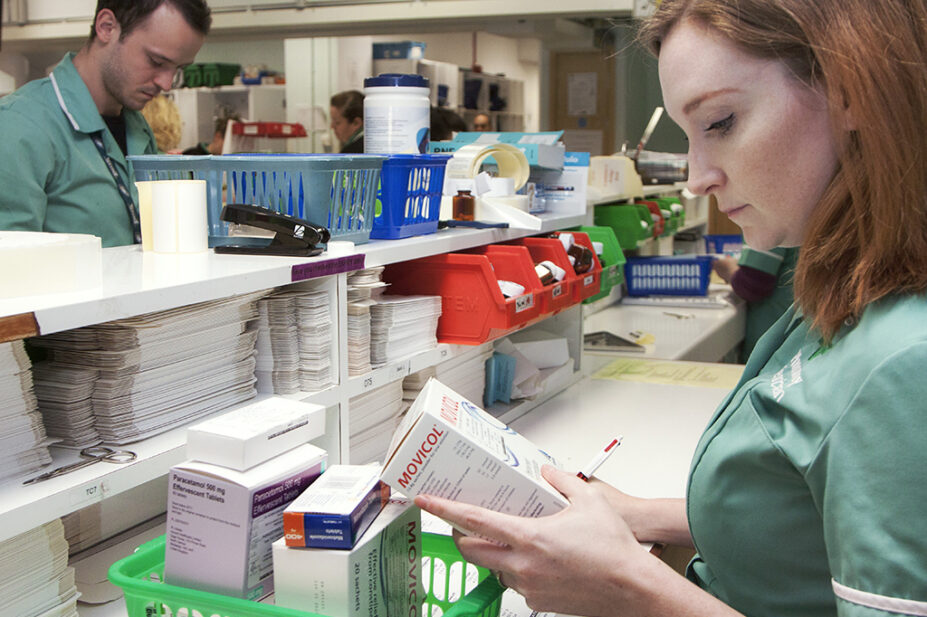
LIFE IN VIEW/SCIENCE PHOTO LIBRARY
All foundation year pharmacists will have their training funded at £26,500 per annum from 2025/2026, NHS Health Education England (NHS HEE) has announced.
NHS HEE announced on 7 November 2023 that it would be “harmonising” the funding available to all foundation training sites hosting a foundation trainee pharmacist in the 2025/2026 training year at £26,500 per trainee.
It said the funding will be “consistent across all sectors of practice and all regions of England”, and is “a contribution to all costs of hosting a trainee, including supervision, administration and salary costs”.
The training funding is an increase from the £18,440 per year that trainees in community pharmacy are currently funded at, and it will ensure that foundation trainees in all settings, including NHS trusts, will be funded equally.
From September 2026, all newly qualified pharmacists will be able to prescribe independently from the day they register with the General Pharmaceutical Council. The new foundation training rates will cover the period when the first tranche of automatic independent prescribing pharmacists will begin their foundation year.
The Royal Pharmaceutical Society (RPS) said the new funding arrangements were an important move towards “parity in funding” across all pharmacy sectors.
Tase Oputu, chair of the RPS English Pharmacy Board, said “increasing the community pharmacy grant, which remained unchanged for many years” is an “important step forward for the pharmacy profession”.
“This approach from NHS England ensures parity in funding across all sectors of pharmacy.
“We appreciate the recognition from NHS England that the costs of supporting the development of a clinical workforce in the community sector have significantly increased and will continue to do so as trainees register as prescribers.”
However, she added: “Although this boost reflects an overall investment in the sector, it’s of note that this grant contributes to costs, not salaries. We know that pharmacy teams are under increasing pressure and hope this change signals the opportunity to further drive up the quality of our trainee pharmacist experience.”
In its statement announcing the new funding rates, NHS HEE clarified that it does not set the salary that a trainee pharmacist must be paid, stating that “each employer must work to its own organisational requirements relating to salary of a foundation trainee pharmacist”.
It added that, where a training site has a reciprocal rotational training arrangement, all of the funding should be retained by the employing site. Where there is rotational training, but no reciprocal arrangement, the employing site should use some of the funding to pay another organisation as a “placement fee”. This could be needed if a foundation trainee needs access to a designated prescribing practitioner at another organisation, for example.
Commenting on the funding announcement, Leyla Hannbeck, chief executive of the Association of Independent Multiple Pharmacies, called the funding increase “derisory”.
“Whilst it is good to see that the funding for the placement has been increased from what the previous offer was, it is not worth anything more when you look back at the last time the fee was increased and then add inflation,” she said.
“£26,500 will work out at less than £13 an hour for a 40-hour contract, [and] with the way national living wage (NLW) is going, NLW could be close to that come year 2025/2026, so there will be nothing left for any admin support or internal training for these trainees, and it is highly likely that contractors will continue to have to fund that themselves, as they are now.”
Nick Kaye, chair of the National Pharmacy Association (NPA), said: “The NPA broadly welcomes this announcement, having worked for several years with key stakeholders to influence the outcome.
“However, as the pharmacy funding includes contributions towards the supervision, administration and salary of a student, it does not go far enough to ensure a level playing field with those healthcare providers aligned to Agenda for Change. Sufficient financial support is necessary to ensure the highest possible standards of training.”
1 comment
You must be logged in to post a comment.



I’m all for levelling the funding across all systems, but this is a minimum of a £10k cost pressure for each trainee within NHS based placements.
How this is a good move for the Long Term Workforce Plan is beyond me.